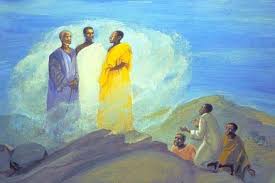Jeremiah 31:31-34;Psalm 51:1-13
Hebrews 5:5-10; John 12:20-33

We shall not, we shall not be moved.
Just like the tree standing by the water
We shall not be moved.
How many of you remember that as a civil rights anthem? The civil rights movement was, of course, one of the great turning points of human history, when people dug in their heels and said, here we are; we shall not be moved. Ordinary people, poor people, people who had been turned away from the corridors of power, from all rights and privileges: ordinary people stood their ground, would not be moved, would not take the easy way out. It would not be an easy fight, they knew, but they would not take the easy way out.
In this passage we read today from the Gospel of John, people called “the Greeks” come to Jesus to offer him an easy way out of what is beginning to seem to be an inevitable and dangerous confrontation. The “Greeks” are the pagans, the non-Jews. Even they had heard of Jesus’ remarkable teachings, and their presence there, at that festival in Jerusalem, is a sign that Jesus has an out. People other than the Jews would embrace him as their teacher – he could leave this dangerous place, Jerusalem, Judea, Galilee even, and go back with them.
And what is Jesus’ answer? He sings a version of “We shall not be moved.” No, Jesus says. This is the hour, this is the moment: it is only when the grain
 falls to earth and dies that it grows to bear fruit. It is only when people give up their lives that they find them for eternal life. It is only this moment when the end is so apparently near that is the moment of glory.
falls to earth and dies that it grows to bear fruit. It is only when people give up their lives that they find them for eternal life. It is only this moment when the end is so apparently near that is the moment of glory. We know the civil rights movement was full of religion. People knew they were led by the spirit, that they were walking the way Jesus walked. Bayard Rustin was one of the leaders of that movement, one of Martin Luther King’s closest associates. In 1952, he sent these words in an Easter greeting* to his friends:
the power of the impotent weak.
From all those years back, Rustin reminds us, followers of Jesus, that we
Unless a grain of wheat falls into the earth … those who love their life lose it … Now is the judgment of this world, now the ruler of this world will be driven out. Think of the circumstances when Jesus said this: he is surrounded by enemies, powerful enemies. His friends are poor peasants and outsiders, the cast-offs of society. NOW is the judgment of this world? The rulers of THIS world will be driven out?
Bayard Rustin knew this, even if it would take more than a decade after he wrote that Easter letter for “the awesome structures of pomp and power” to begin to disintegrate.
Today, on the 5th Sunday of Lent, we are still on this side of Easter; we don’t yet know the ending of the story. Jesus’ words seem mysterious and inexplicable to some, as preposterous bluster to others. How can a world be put back together after its destruction?
Jeremiah, writing hundreds of years earlier, writes to the people of Israel in just such a situation. They are in captivity in Babylon, their city and nation destroyed, and God sends Jeremiah to them in exile. Yes, you broke that covenant – you broke my heart, God says – but I am still with you. I love you, I will be with you. My law will no longer be something external, something you can break or change at will. Now I will be in your hearts, God says. Not out there; in here. Wondrous, wondrous love.
The worst can happen, Jeremiah says to the people, but God is still there. The world can be dark and discouraging, but God is still there. God’s judgment will prevail, God’s glory will shine. What is hard, today, is to hear Jeremiah’s good news next to what Jesus says.
What is hard, today, is that mostly we hear all too clearly the words of death and judgment; we don’t yet know what Jesus means by bearing fruit or eternal life or glory out of thunder.
We may not yet, but we will.
* I thank my friend Gale Kenny for calling my attention to these words of Bayard Rustin, quoted by David L. Chappell in A Stone of Hope: Prophetic Religion and the Death of Jim Crow (Chapel Hill: University of North Carolina Press, 2004), p. 56




.jpg)
.jpg)







.jpg)
